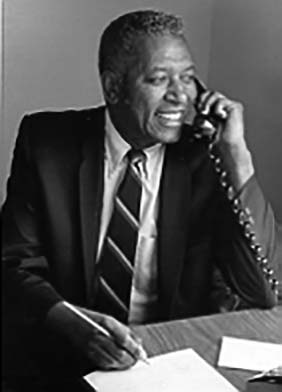Willard L. Bowman was a union organizer, politician, and civil rights activist in Anchorage, Alaska. From 1963 to 1970, he served as the first director of the state’s Human Rights Commission. In 1970 he was one of the first African Americans elected to the Alaska State Legislature.
Bowman was born in Grand Rapids, Michigan, on August 18, 1919. At the age of 19 he joined the U.S. Navy. He served in the Pacific theater of World War II and was discharged from service at the end of the war in 1945. Five years later he moved to Anchorage, Alaska, which was then experiencing a construction boom due to increased Cold War-era military spending. Bowman worked as a laborer, labor management consultant, and union organizer.
Much of his work in the labor movement was focused on gaining equal employment opportunities for Alaska’s black population. In 1952 he served as president of the Association for Local Improvement (ALI), a community group that was modeled after the National Urban League. In that capacity he not only pressed territorial and federal officials to hire black laborers on publicly funded construction projects, but he also urged them to prohibit the jobsite discrimination many of them regularly reported.
Bowman was one of the driving forces behind the enactment in 1953 of the territory’s Fair Employment Act, which prohibited discrimination on the basis of race and established an administrative process within the Department of Labor for investigating and resolving cases of workplace discrimination. The Act was sponsored by the Central Labor Council and the Anchorage chapter of the National Association for the Advancement of Colored People (NAACP). As a member of both groups, Bowman was instrumental in bringing the coalition together.
In 1963 Bowman was appointed by Governor William Egan to be the first director of the Alaska Human Rights Commission, a body established to receive, initiate, and investigate complaints of discrimination in employment, housing, and public accommodations when based on race, creed, color, national origin, age, or sex. Believing that many Alaskans were simply unaware of the nature and extent of discrimination, Bowman made education one of the commission’s primary goals. He traveled widely throughout the state, delivering countless speeches to community groups in which he encouraged citizens to take direct responsibility for the eradication of discrimination.
A lifelong Democrat, Bowman was elected to the Alaska House of Representatives in 1970. Bowman and Joshua Wright, another black legislator from Anchorage voted into office that year, were the first African Americans elected to the legislature in the state’s history. Bowman was reelected to two additional terms in the State House.
Willard Bowman died of cancer while in office on December 3, 1975. He was 56 years old.
In 1991 the Anchorage School District honored the legislator and civil rights activist by naming a school in south Anchorage the Willard L. Bowman Elementary School.

